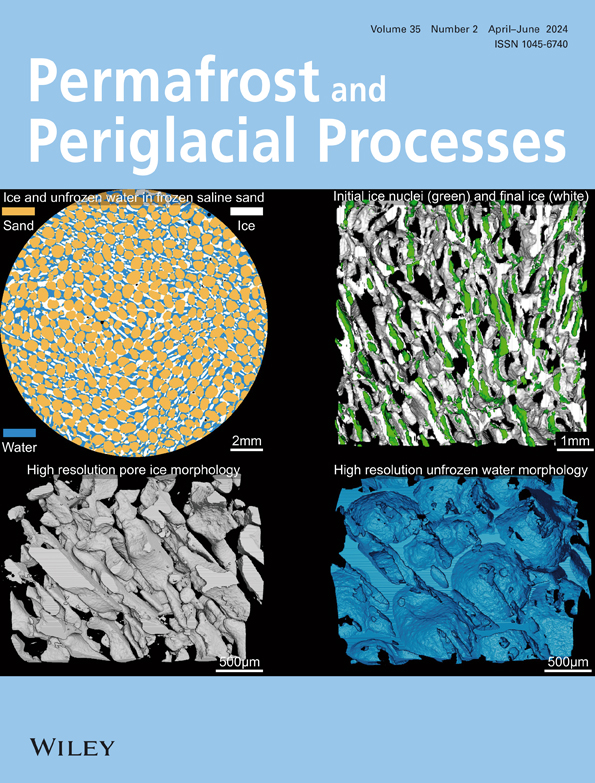基于土壤结冰概率预测未冻水含量的分析模型
IF 3.3
3区 地球科学
Q2 GEOGRAPHY, PHYSICAL
引用次数: 1
摘要
在寒冷地区,未冻含水量随温度的变化严重影响冻土中的热量和水分的耦合传输,由于冰和水的相变而引起冻胀和解冻沉降,并影响土壤的稳定性。因此,分析水分冻结的机理并建立土壤未冻结含水量的预测模型至关重要。在本研究中,建立了一个基于等效接触角的分析模型来预测未冻结的含水量。基于非均匀形核速率随温度非线性下降的假设,得到了等效接触角与温度之间的关系。利用青藏高原粉质粘土材料在不同温度下的现有未冻结含水量数据,验证了所提出的分析模型,并与预测土壤材料中未冻结含氧量的几种现有数值模型进行了比较。结果表明,未冻水含量与等效接触角关系密切,等效接触角随温度的降低而增大。同时,当接触角较小时,土壤中的孔隙水首先冻结。此外,分析模型预测的未冻结含水量值与实验结果吻合良好,尤其是在低温条件下和水冻结早期。本文章由计算机程序翻译,如有差异,请以英文原文为准。
Analytical model to predict unfrozen water content based on the probability of ice formation in soils
The variation in unfrozen water content with temperature substantially affects coupled heat and water transport in frozen soil, causing frost heave and thaw settlement owing to the ice and water phase change and influencing soil stability in cold regions. Thus, analyzing the mechanism of water freezing and building a predictive model for the unfrozen water content of soils is paramount. In this study, an analytical model based on equivalent contact angle was developed to predict the unfrozen water content. The relationship between the equivalent contact angle and temperature was obtained based on the assumption that the heterogeneous nucleation rate nonlinearly decreased with temperature. The proposed analytical model was validated using existing unfrozen water content data at various temperatures for a silty clay soil material from the Qinghai–Tibet Plateau, and compared to several existing numerical models which predict unfrozen water content in soil materials. The results revealed a close relationship between the unfrozen water content and equivalent contact angle, and the equivalent contact angle increased as the temperature decreased. Meanwhile, the pore water in the soil first froze when the contact angle was smaller. Moreover, the values predicted by the analytical model for the unfrozen water content agreed well with the experimental results, especially under low‐temperature conditions and during the early stage of water freezing.
求助全文
通过发布文献求助,成功后即可免费获取论文全文。
去求助
来源期刊
CiteScore
9.70
自引率
8.00%
发文量
43
审稿时长
>12 weeks
期刊介绍:
Permafrost and Periglacial Processes is an international journal dedicated to the rapid publication of scientific and technical papers concerned with earth surface cryogenic processes, landforms and sediments present in a variety of (Sub) Arctic, Antarctic and High Mountain environments. It provides an efficient vehicle of communication amongst those with an interest in the cold, non-glacial geosciences. The focus is on (1) original research based on geomorphological, hydrological, sedimentological, geotechnical and engineering aspects of these areas and (2) original research carried out upon relict features where the objective has been to reconstruct the nature of the processes and/or palaeoenvironments which gave rise to these features, as opposed to purely stratigraphical considerations. The journal also publishes short communications, reviews, discussions and book reviews. The high scientific standard, interdisciplinary character and worldwide representation of PPP are maintained by regional editorial support and a rigorous refereeing system.

 求助内容:
求助内容: 应助结果提醒方式:
应助结果提醒方式:


